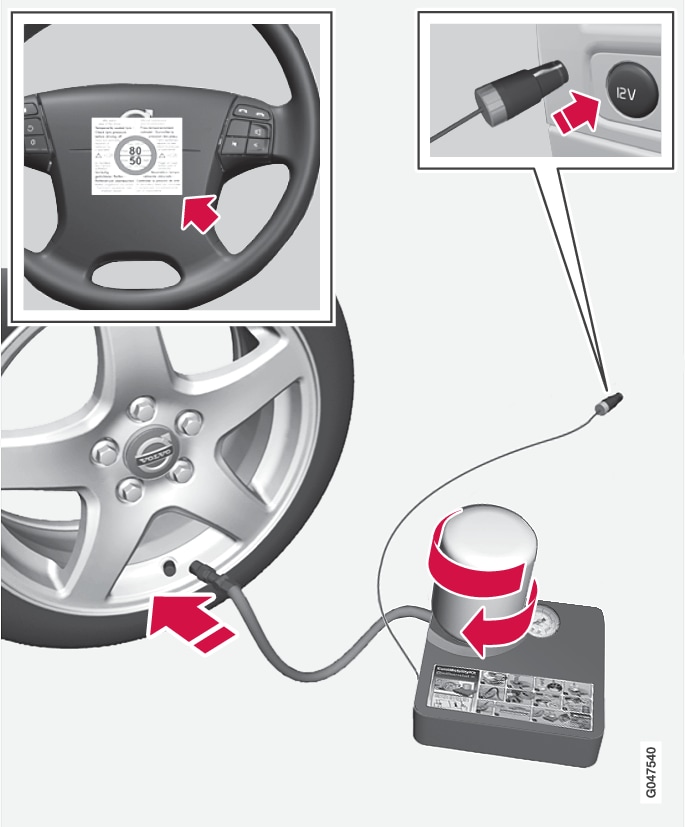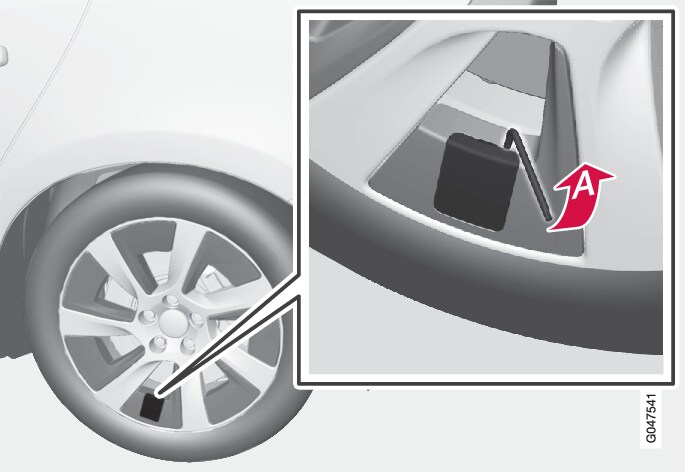Emergency puncture repair

Detach the label for maximum permitted speed (which is fitted on one side of the compressor) and affix it to the steering wheel.
Warning
You should not drive faster than 80 km/h after the emergency tyre repair kit has been used. Volvo recommends that you visit an authorised Volvo workshop for inspection of the sealed tyre (maximum driving distance is 200 km). The staff there can determine whether or not the tyre can be repaired or if it needs to be replaced.
Warning
The sealing fluid can irritate the skin. In the case of contact with skin, wash away the fluid with soap and water.
Check that the switch is in position 0 and locate the cable and the air hose.
Note
Do not break the bottle's seal before use. The seal is broken automatically when the bottle is screwed in.
Unscrew the orange cap and unscrew the bottle's stopper.
Screw the bottle into its holder.
Warning
Do not unscrew the bottle, it is equipped with a reverse catch to prevent leakage.
Remove the valve cover1
Take the torx wrench (which is fitted in the foam block behind the panel on the left-hand side of the cargo area).
Press the torx wrench into the hole.
Prize off the cover using the torx wrench (A).

Unscrew the valve cap and disconnect the hose from the compressor to the valve.
Connect the hose from the compressor to the valve.
Plug the cable into the 12 V socket and start the car.
Note
If the compressor is connected to one of the two 12 V sockets, in the tunnel console, no other current consumer must be connected to the other one.
Warning
Do not leave children in the car without supervision when the engine is running.
Flick the switch to position I.
Warning
Never stand next to the tyre when the compressor is running. If cracks or unevenness arise then the compressor must be switched off immediately. The journey should not be continued. Contacting an authorised tyre centre is recommended.
Note
When the compressor starts, the pressure can increase up to 6 bar but the pressure drops after approximately 30 seconds.
Inflate the tyre for 7 minutes.
Important
Risk of overheating. The compressor must not run for more than 10 minutes.
Switch off the compressor to check the pressure on the pressure gauge. Minimum pressure is 1.8 bar and maximum 3.5 bar. (Release air with the pressure reducing valve if the tyre pressure is too high.)
Warning
If the pressure is below 1.8 bar then the hole in the tyre is too big. The journey should not be continued. Contacting an authorised tyre centre is recommended.
Switch off the compressor and unplug the cable from the 12 V socket.
Detach the hose from the tyre valve and fit the valve cap.
Press the cover2 back over the tyre valve with the hole against the wheel's hub. Two clicks confirm that the cover is fitted in place.
As soon as possible, drive approximately 3 km at a maximum speed of 80 km/h so that the sealing fluid can seal the tyre.